A Historical Perspective of our journey since Independence
By Philip Mudartha
Bellevision Media Network
Preface:
It has become a habit for Arvind Kejriwal, the IIT engineer turned social activist turned politician, the CM of NCT and AAP national convener to bemoan that the past governments for seventy-five years since our independence have done nothing but loot to enrich themselves and their families. His utterances do no good to his image as a leader with a vision for the country and his passion to improve the lives of ordinary people.
Kejriwal is neither the first nor will he be the last to speak such “un-truths”. The ministers and leaders of the short-lived Janata Government in 1977 had also hurled similar accusations about the 30 years of mis-rule by Congress Party led by three former PMs Jawaharlal Nehru, Lal Bahadur Shastri and Indira Gandhi. Not a day passes without our incumbent PM Narendra Modi trying to deny credit to previous governments for their contribution in nation-building and development.
Part of the problem with the criticisms by Kejriwal and Modi is the absence of context. The world in which Nehru, Shastri and Indira Gandhi served as prime ministers between 1947 and 1977 was very different.
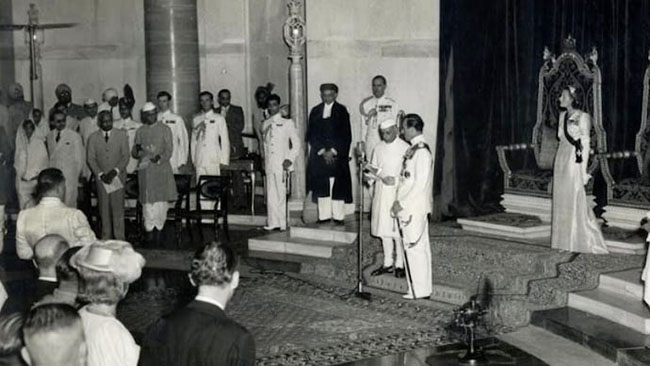
The India at independence:
Historian Benjamin R Siegel’s book titled “Hungry Nation: Food, Famine and the Making of Modern India” makes a stark point: independent India was born in hunger and hunger lay at the roots of much of its public policy in its early years.
It was perhaps inevitable that starvation would cast a shadow over independence. Famines had stalked India for generations. Ever since the Bengal famine of mid-forties of the previous century during the penultimate years of Imperial British Raj, food situation in India has been precarious till 1972. When the Interim Government led by Pandit Nehru took reigns as a precursor to formal Independence, on 2nd September 1946, Nehru made frantic efforts to import foodgrains from Indonesia, Thailand, Burma and from anywhere where a surplus was reported.
From 1946 to 1972, India imported 93,247,000 tons of foodgrains valued at Rs 4,827.58 crores. The largest imports were in 1966 and 1967 as indicated below:
1966: 10,358,000 Tons valued at Rs 523.13 crores.
1967: 8,672,000 Tons valued at Rs 532.16 crores.
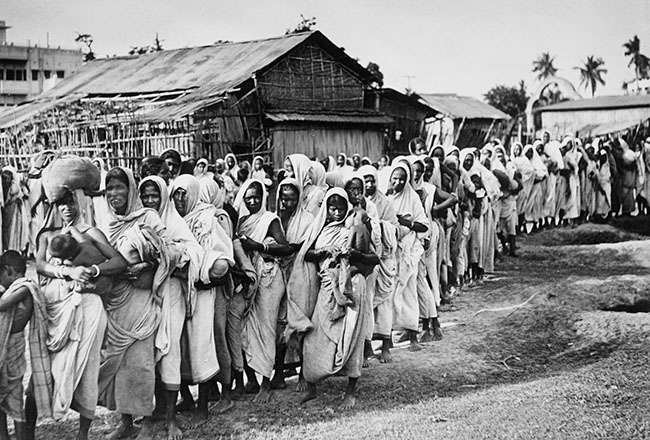
It is a redoubtable credit for Nehru, Shastri and Indira Gandhi that their governments managed the food production, procurement and distribution such that the nation did not suffer the ignominy of famine, mass starvation and deaths.
In this context, there was no alternative but to accord topmost priority to feed a hungry nation. The policy choices that Congress Party made was to usher a planned economy with agriculture development, irrigation, and heavy basic industries in the public sector.
India attained self-sufficiency in food by 1972. The success story of our Green Revolution is widely known and does not merit detailing here.
India did not exist as we know it:
Nehru-baiters like Narendra Modi and Congress-baiters like Arvind Kejriwal rejoice in berating the legacy of prominent persons in the pantheon of our freedom fighters. They refuse to acknowledge the sacrifices made by, say Motilal Nehru and his illustrious children Jawaharlal Nehru and Vijay Laxmi Pandit. They ignore the historical fact that the India at the time of independence was not the present-day India in which Modi and Kejriwal live and rule.
Before the Partition of India in 1947, about 584 princely states, also called “native states”, existed in India, which were not fully and formally part of British India. Together these states formed 40% of the area of the sub-continent with 25% of total population. Upon transfer of power by the British Raj, the rulers of these princely states were given the choice of either joining India or Pakistan or remaining independent. Barring Jammu & Kashmir, Junagadh, Mysore, Travancore and Hyderabad – all big states – others chose to accede to either Pakistan or India. (the territory of princely states on 14 August 1947 shown in red color in the map shown below)
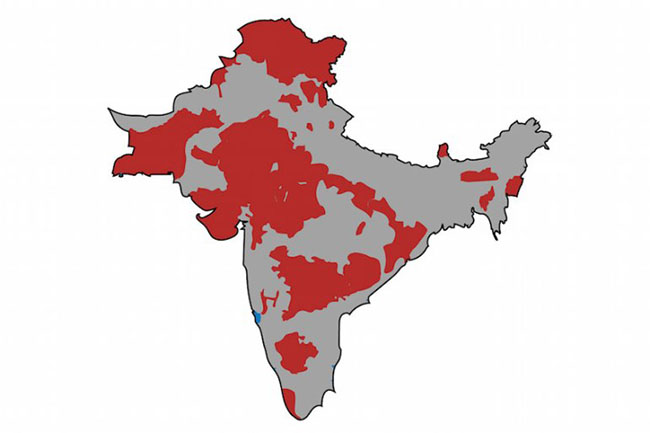
Over four hectic years, from 1947 to 1951, Government of the Dominion of India with Jawaharlal Nehru as PM and Sardar Vallabh Bhai Patel (Patel died in December 1950) as Home Minister undertook the daunting task of securing the accession and integration of 565 princely states. “Today we think of the integration of the States only in terms of the consolidation of the country, but few pause to consider the toils and anxieties that had to be undergone till; step by step the edifice of a consolidated India was enshrined in the Constitution. It was a co-operative effort in which everyone from Sardar, our inspiration and light, down to the rank and file played his part,” remembers V. P. Menon. The senior ICS officer was Home Secretary whose direct boss was Sardar Patel but also dealt with PM Nehru and Lord Mountbatten, our first Governor-General when required. Menon has detailed his experiences in his voluminous book titled “The Story of Integration of Indian States”, first published in 1956. Recently, I read this 586-page international best-seller of that era and I can assert that it is an un-putdownable account of history. I recommend to Modi and Kejriwal to read it.
The Holocaust Accompanying Partition:
“The partition of British India was an extraordinary event. It brought forth giant personalities, monumental egos, brilliant strategists, saints, scoundrels, politicians, thinkers, tinkers, stinkers, sages and sycophants. Like an angry volcano it spewed forth human passions in their ugliest form consuming oceans of humanity. In its aftermath it left more than a million dead, fifteen million refugees and tens of thousands of women abducted. Two nations inherited the Raj and were immediately locked in mortal combat.” This is the gist of that tragic event when Pakistan was created as a nation for Muslims of the subcontinent, as chronicled in a concise book titled: “The Partition of India.”
Today, we are privileged to be in the internet age, with all sorts of information at our fingertips. With a few clicks of the mouse, we can access books, pamphlets, images and articles depicting the gory details of the communal frenzy which occurred in the wake of transfer of power. The ethnic cleansing of Hindus and Sikhs what was undertaken by Muslim mobs in West Punjab, Sind, and East Bengal. In retaliation against Muslims in East Punjab and West Bengal. The Hindus and Sikhs attacked, killed, maimed Muslims. The murders, arson, abduction, abuse and rape resulting from the senseless communal frenzy is nothing short of the Jewish Holocaust of the fascist regime under Hitler.
With the benefit of hindsight, we may condemn leaders like Gandhi, Nehru, Patel, Jinnah and a host of others for not anticipating the holocaust that was to descend on northern India once the partition plan was announced. We may conclude that partition was their collective failure. Or worse, choose to blame any one of the stalwarts I mentioned above depending on our politics.
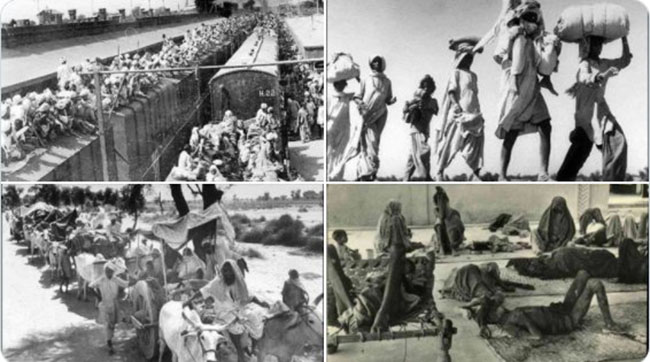
The War with Pakistan over J&K:
Weary of the mounting tensions in India, alarmed at the mutiny of the Royal Indian Navy, and shocked by one of the worst communal riots in Calcutta which began on 16th August 1946 in response to Direct Action call issued by Jinnah, the British cabinet led by Labor Party leader Clement Atlee was in a hurry to exit from colonial India. His new viceroy in Delhi, Lord Mountbatten, was tasked to complete the transfer of power by June 1948.
However, Lord Mountbatten was in greater hurry than his PM. He wanted to be out on 15th August 1947, which date marked the second anniversary of Japan’s surrender in World War II. Pakistan came into being on 14th August 1947. Free India was born at the midnight hour, the 15th August 1947.
The Hindu Maharaja of J&K majority of whose subjects were Muslim dreamt of a state independent of both Pakistan and India, similar to Switzerland in Europe. But a Muslim uprising was brewing in the Kashmir Valley, which promoted Pakistani tribal militias to cross the borders on 22nd October 1947. When Srinagar was besieged, the Maharaja sought military help from India. India insisted that he sign the instrument of accession which he did on 26th October 1947. India sent its troops to the valley to drive the militias out. Pakistani forces launched a full-scale invasion of the state which led to the first Indo-Pak War. On 1st January 1949, a ceasefire was agreed upon which left India in control of Kashmir Valley, most of Jammu province and Ladakh which formed 2/3rd of J&K state. The other 1/3rd comprising western districts of the state were held by Pakistan.
India laid claims to the entire princely state of J&K based on the instrument of accession signed by the Maharaja on 26th October 1947. Pakistan contended that the accession was signed under duress by the Maharaja who did not have popular mandate and laid claims to the entire state because it had Muslim-majority population. Moreover, it was contiguous with Pakistan.
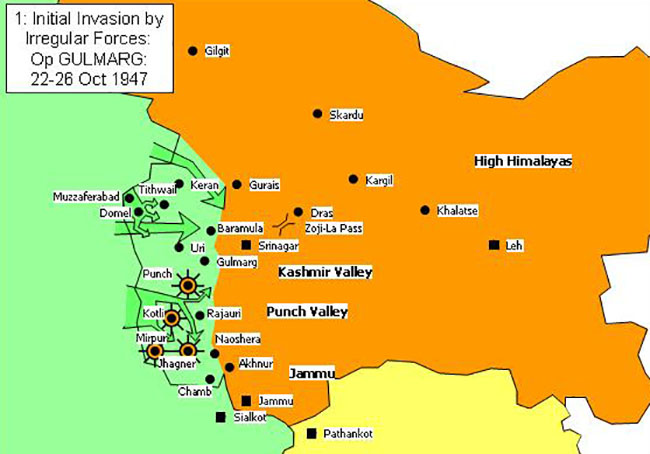
The high burden of defense expenditure:
The British India Army had a strength of nearly 2.5 million including volunteers during the World War II, when the Indian soldiers fought on the side of Great Britain against the Axis Powers, Germany, Italy and Japan. 87,000 died, 34,354 wounded and 67,340 taken prisoners. The Imperial Army of Japan over-ran British India forces and captured British Burma. If the Americans did not drop atomic bombs on Hiroshima and Nagasaki on 6th and 9th of August 1945, Imperial Japanese Army would have marched into Assam and beyond to defeat and expel the British from Indian soil.
Over forty thousand Indian soldiers surrendered to the Japanese. Of these, over thirty-five thousand Indian soldiers, Muslims, Sikhs and Hindus alike, joined the Indian National Army (Azad Hind Fawz, INA) led by Subhash Chandra Bose. When Japan surrendered on 15th August 1945, the captured INA soldiers were put on trial in Delhi “for waging war on the King Emperor”. INA commanders, Hindus, Muslims and Sikhs, were successfully defended at the trial held at Red Fort by Pandit Jawaharlal Nehru and Bhulabhai Desai (both British-trained barristers).
After the end of WW-II, the demobilization of Indian soldiers in the British India Army began. On the eve of independence, there were 400,000 active personnel. They were distributed to the two dominions, India receiving 260,000 men and Pakistan acquiring the rest.
The demobilizing costs, the pensions, wages, administrative expenses and the costs of J&K operations were humongous. According to Department of Economic Affairs’ website, the total expenditure for seven and half months from 15 August 1947 to 31st March 1948 was estimated at Rs 197.29 crores. Out of this, Rs 92.40 crores was on account of defense services. This is a whopping 47% of total expenditure and 54% of total revenue of Rs 171.15 crores. (The defense expenditure in 2022-23 is just 13.3% of total expenditure and 23% of total revenue. Hence more money is available today for governance, social sector spending and development.)
Additionally, a sum of Rs 5.80 crores was reserved as payment of privy purses to former princes of native states which will merge with India. A sum of Rs 20.39 crores was devolved to provinces. With the remaining Rs 52.56 crores, the country should be governed and development schemes to be implemented!
What a pitiful economic situation for us to be in as freedom dawned and an Independent India had to manage its finances on its own!
Adopting the Constitution of the Republic of India:
We all know that Dr. B. R. Ambedkar headed the august body of experts to draft a new constitution of the Republic of India. Upon approval by interim parliament, the constitution came into force on 26th January 1950. We mark this day as Republic Day, and celebrate it with pomp and grandeur.
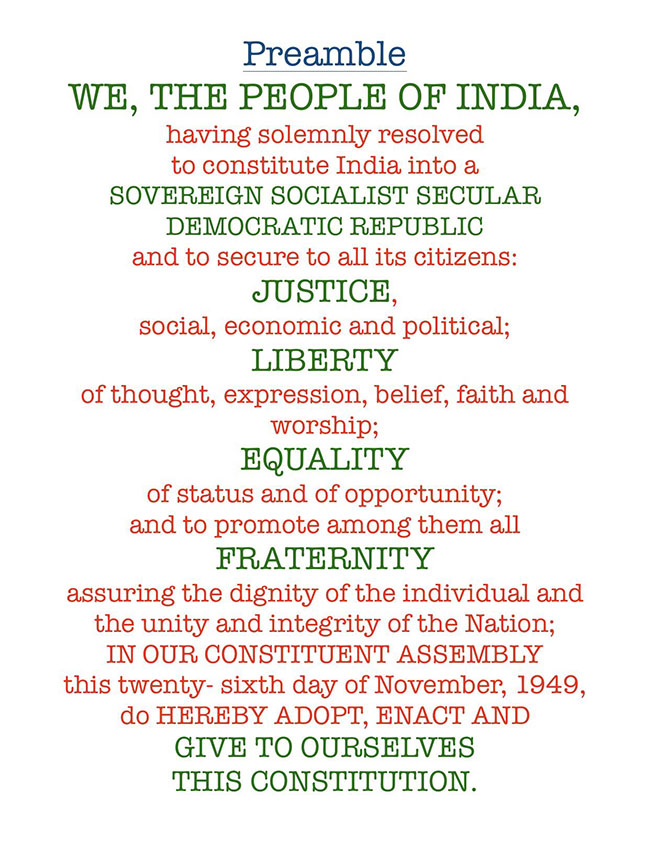
The First National General Elections:
Belying the prediction by former British PM and opposition leader at the time of our independence, Winston Churchill, India voted to elect its first government between 25 October 1951 and 21 February 1952 based on universal adult franchise. Every Indian aged 21 and above could vote regardless of caste, creed, class, gender, color of skin, literate or illiterate, rich or poor.
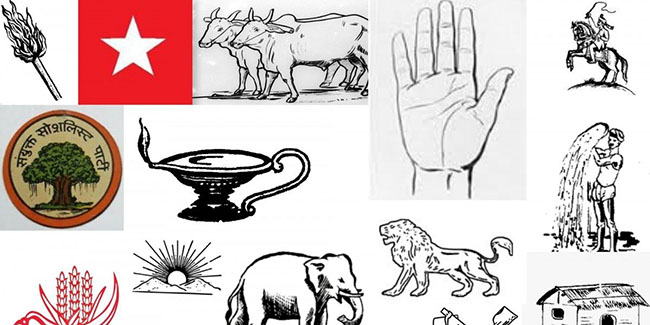
It is a tribute to the founders of our nation and the successive governments of modern India since 1952 that democratic institutions were built, nurtured and sustained to establish rule of law in the land.
Establishing of institutions of higher learning:
Arvind Kejriwal had the opportunity to be an alumnus of IIT, the institutions of excellence that a free India founded, funded and nurtured. Such higher learning institutions such as IIMs, IISc, AIIMs, BARC, ISRO, TIFR, several premium medical colleges, agricultural universities with research for hybrid seed production to power the green revolution, the police academies, the defense academies etc., the IAS, IPS, IFS, etc., to produce excellent officers to govern the country are products of the policy focus of our national governments in the initial years of our independence.
Establishing a secular polity and a socialist economic order:
In a country of diverse religious background known for frequent communal riots and civic strife between castes and classes, founders of our nation led by Jawaharlal Nehru were clear in their mind that only a secular and socialist India would ensure peace, stability and prosperity. Today, in hindsight, doubts are expressed on the wisdom of the policy choices that they made without understanding the context of those decisions. Do not forget that the electorate of the time endorsed these policies with thumping mandate. These policies were not imposed on the nation by authoritarian governments, unlike say, in Pakistan, China and Russia.
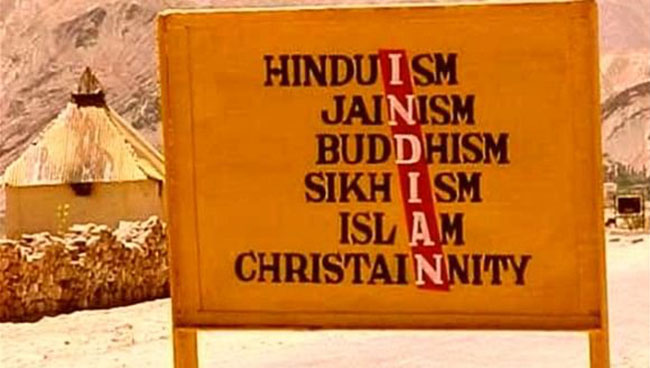
To be continued.....
| Comments on this Article | |
| Clarence, Mangalore, qatar | Sat, October-22-2022, 1:21 |
| Wonderful article. Thanks Philip | |
| Michael Sequeira, pamboor/ Nairobi | Wed, October-12-2022, 5:56 |
| Thoroughly enjoyed going through the article.Simple language and clear message on our history of independence time and the leaders is brought before readers without any bias. Am sure our current leaders Modi and Kejriwal surely acknowledge the contribution but politics being what it is they need to raise their voices unlike our dear politics free leader Manmohan Singh. Thanks Philip for enlightening the readers to make a wise call on their opinion. Waiting to read more on this. | |
| Ronald D, Moodubelle | Wed, October-12-2022, 4:02 |
| Wonderful article by Philip. Nehru, Shastri and Indira Gandhi were not hungry politicians unlike today and they tried best to help hungry citizens. About partition my personal opinion - India is better off without Pakistan. But regret having lost Gilgit Bastion, which hardly had any population then and a fertile land with scenic beauty. On the other hand, we should be happy that we have Kashmir slowly integrating into Indian mainland by scrappage of A370. Kejriwal is educated and non-corrupt and we get to hear lots of positives on his way of governance. Hope corruption gets reduced, and we get to enjoy basic amenities like roads, infrastructure and so on otherwise we are losing it to ongoing big percentage. | |
| Gouse, Visakhapatnam | Wed, October-12-2022, 12:33 |
| Superb Sir… | |




 Write Comment
Write Comment E-Mail To a Friend
E-Mail To a Friend Facebook
Facebook Twitter
Twitter  Print
Print 














